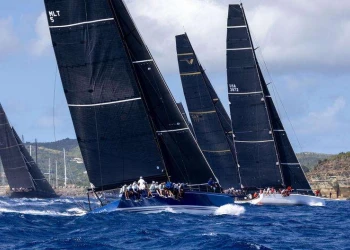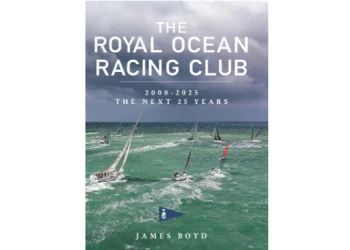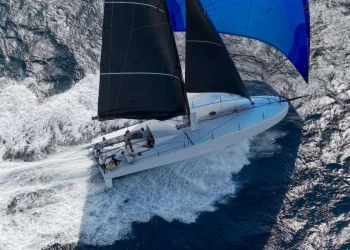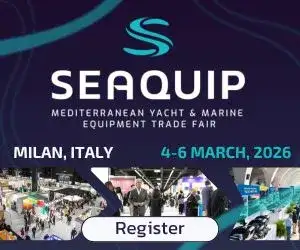
Arto Linnervuo's Finnish xP-44 Xtra-Staerk in the midnight sun - competing in the inaugural Roschier Baltic Sea Race
Roschier Baltic Sea Race, the new adventure has begun
The inaugural Roschier Baltic Sea Race started on time outside the historic Port City of Helsinki Finland. Twenty seven boats with over 213 sailors from 18 different nations started the first chapter of the 635-nautical mile race in the Baltic Sea, organised by the Royal Ocean Racing Club together with the Ocean Racing Alliance.
Helsinki is north of the 60th Parallel and in July sunlight is virtually continuous, so the early evening start was witnessed by an armada of orderly spectator boats, with Helsinkians basking in the warm sunshine and a light southerly breeze. The Roschier Baltic Sea Race is a marathon not a sprint, but all three IRC starts were extremely competitive. In the big boat IRC Zero Class, TP52 Outsider respectfully took penalty turns within minutes of the start after a port-starboard incident with Ambersail 2. The breeze filled in as the international fleet made their way past the Helsinki Lighthouse, 12 miles into the 635-mile race.
Jeremy Wilton, RORC CEO commented after the start: "It's been a great start to the first edition of the Roschier Baltic Sea Race and seeing it come to fruition after much planning in a city such as Helsinki with such strong maritime history. One of its unique factors is it's the first 600-miler that starts and finishes in a major capital city, so, because of that it is great for the profile of offshore racing and the IRC Rating Rule."
Three hours after the start, leading the race for Line Honours was VO65 Ambersail 2, with American skipper Clarke Murphy at the helm, just ahead of Volvo 70 I Love Poland, skippered by Grzegorz Baranowski. Tilmar Hansen's German TP52 Outsider was third on the water. The early tactical decision was whether to hug the coast of Suomenlinna Island or stay nearer the rhumb line to Helsinki Island. Outsider chose the latter, while the three canting keelers went inshore. Ambersail 2 was visibly lifted inshore and looked to make an early gain.

In IRC One, Arto Linnervuo's Finnish xP-44 Xtra-Staerk had a superb start, judging the line to perfection in a ball of boats at the Committee Boat end of the line. Three hours after the start, the racing was just as close. Xtra-Staerk was the first in class to round the Helsinki Lighthouse, followed by Pasi Uoti's Finnish Sydney 40 Rush. A pack of boats were in close pursuit, including Niclas Heurlin's Swedish Farr 400 Wetjob, German Millennium 40 Edelweiss, skippered by Ove Franck, Hakan Groenvall's Swedish First 40 C-me, and Ed Bell's British JPK 1180 Dawn Treader.
In IRC Two, Olof Granander's Swedish First 40.7 Embla was the first in class to round Helsinki Lighthouse, closely followed by Margus Uudam's Estonian J/112 Nola. Ilmari Absetz's Finnish IM3 38 Kind of Magic was the third in class to turn west.

Four teams are competing in IRC Two-Handed for the Roschier Baltic Sea Race. Paer Lindfors and Nadine Kugel racing Swedish Albin Nova Team Mobline performed the best start of the entire starting sequence. However, the clear leader on the water three hours into the race was the Finnish J/109 Irie, sailed by Julius Haartti and Sanna Moliis. Finngulf 41 Indigo sailed by Pyry Alamaeki and Goeran Antila was going well, as was Anders Lundmark and Louise Edgren racing Danish Figaro 2 The Spirit.

The Roschier Baltic Sea Race looks set for a complex weather scenario in the coming days. The dock talk before the start had a recurring theme. A crucial part of the entire race was making good speed to the Almagrundet Lighthouse outside the Stockholm archipelago. Good wind speed is expected to last until the afternoon of day two. After that, boats may see the wind dissipate giving a big change to the end game.
"We couldn't organise this race without our partners and sponsors who have helped and supported us in getting this first edition off the ground," commented Jeremy Wilton, RORC CEO. "So, it's a big thank you to Roschier, the title sponsor and our other partners, plus of course, all the volunteers who have worked so hard in bringing this first edition alive. We think it has every opportunity to grow and become one of the classics."
The official race supporters of the Roschier Baltic Sea Race are: The City of Helsinki; The Nyländska Jaktklubben (NJK), Finnish Offshore Racing Association (AMP); Helsingfors Segelklubb (HSK); FINIRC and the Xtra Stærk Ocean Racing Society.





